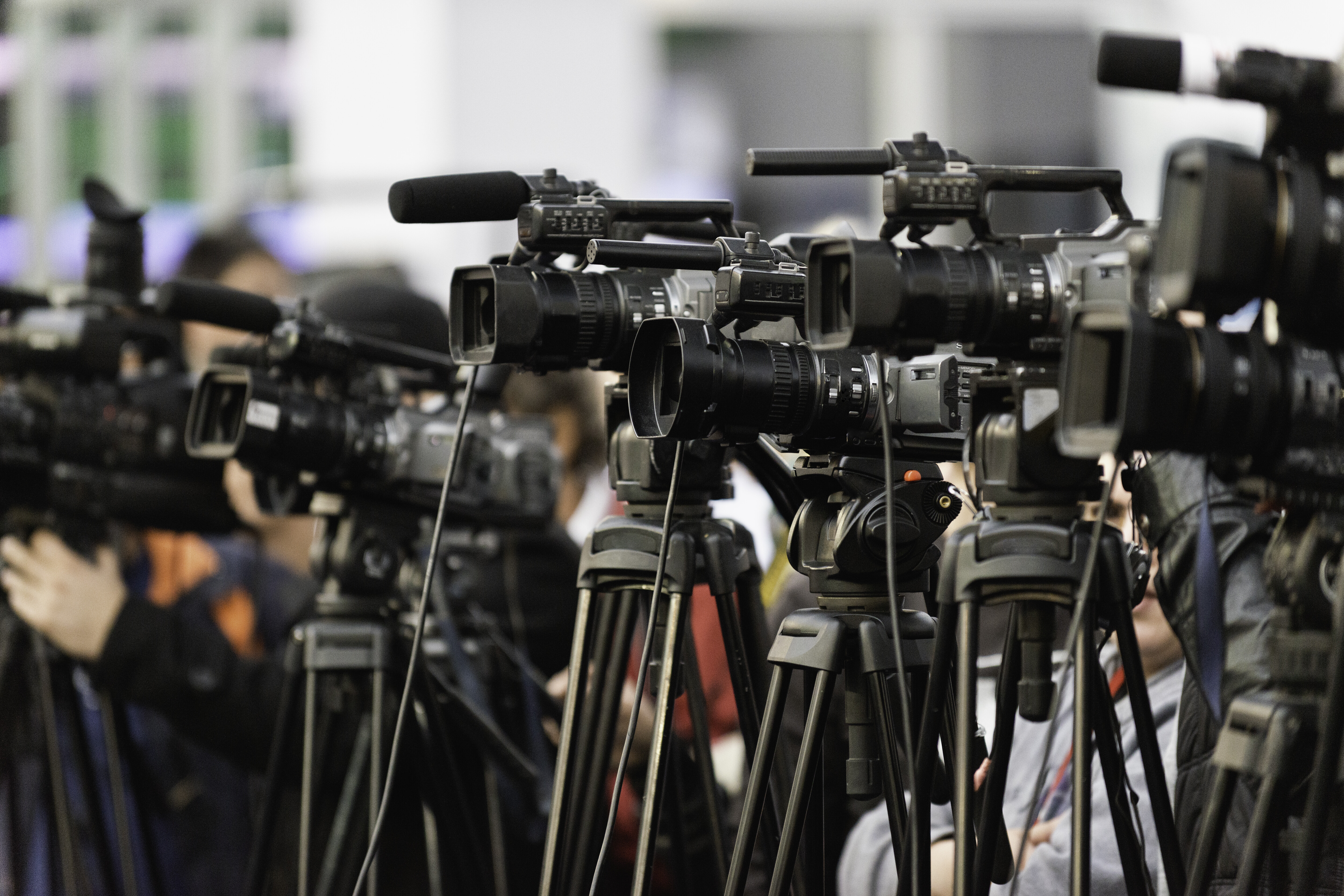Our weekly round-up of public service media related stories and headlines from around the world.
Click on the drop-down menus below to reveal the latest regional stories.
EGYPT: Egypt frees award-winning photojournalist from prison after 5-year term
Deutsche Welle: Mahmoud Abu Zaid was detained while covering clashes between protesters and security forces in 2013. While incarcerated, DW published a letter in which he wrote that he didn’t know “when this nightmare is going to end.”
ERITREA: Eritrean Press: Reporting on Africa’s most secretive state
BBC News: He’s the editor of a popular Facebook page that provides news from a country with one of the world’s worst records on press freedom. But not even the journalists who write for him know his real identity.
LIBERIA: MFWA Hails Repeal of Libel in Liberia
MFWA: President Weah signed into law on February 28, 2019 a bill to amend sections 11:11, 11.12 and 11.14 which prescribed prison terms for a range of speech offenses.
NIGERIA: Nigeria’s ICIR is training journalists to investigate contracts and procurement fraud
IJNet: In Nigeria, the International Centre for Investigative Reporting (ICIR), an independent, non-profit news agency, is empowering journalists to report on and expose corrupt practices among public office holders.
NIGERIA & SENEGAL: Takeaways from elections in Nigeria and Senegal
Deutsche Welle: What does Senegal have in common with Nigeria regarding elections? Very little if anything. The former is regarded as a stable democracy, the latter is not. But experts say Abuja and Dakar can learn from each other.
SOUTH AFRICA: Democracy Gauge officially kicks off on SABC platforms
SABC News: In commemorating 25 years of democracy, SABC News has embarked on a campaign turning our lenses and mics over to South Africans.
SOUTH AFRICA: SABC remains independent in lead-up to May polls
SABC News: Sunday newspaper report alleged that the ANC was pressuring the SABC to increase coverage of campaign events. The SABC says it is committed as the public broadcaster to remain independent and impartial in the lead-up to the May polls.
SOUTH AFRICA: South Africa Misses Deadline For DTT In The Free State Province
Broadcast Media Africa: The province was earmarked to be the one that would be first in line to fully migrate.
TANZANIA: Tanzania: Government suspends Citizen Newspaper for seven days
IFJ: The Government of Tanzania has suspended the Citizen, a privately-owned daily newspaper, for seven days claiming that it “deliberately published misleading news about the depreciation of the Tanzanian Shilling against the dollar” on Saturday, 23 February 2019.
UGANDA: Millions of Ugandans quit internet services as social media tax takes effect
The Guardian: Economic fears raised as online subscriptions plummet in months following launch of levy created to curb ‘gossip’.
ZAMBIA: Critical Zambia private TV station shut
The East African: Zambian authorities Monday suspended a broadcast licence for a Lusaka-based private TV station deemed to be anti-government.
ZAMBIA: Suspension of independent news station a ploy to muzzle independent voices
Amnesty International
HONG KONG: In Hong Kong, a ‘weaponized’ free press becomes China’s tool of surveillance
The Globe and Mail: With staff from Beijing-controlled outlets following their every move, paparazzi-style, independence activists fear a chilling effect on democracy.
HONG KONG: HKJA launches petition in response to Access to Information consultations
IFJ: Following the launch of the public consultation by the Law Reform Commission (LRC) of Hong Kong into access to information legislation, the Hong Kong Journalists Association (HKJA) has launched a petition with several recommendations for any new legislation.
INDIA: #MemberNews: Khabar Lahariya brings women’s voices to rural media in India
IPI: Pooja Pande, head of partnerships at Khabar Lahariya, describes how Khabar Lahariya’s critical journalism is transforming rural news in India, and women’s role in it.
INDIA: Future of digital broadcasting is moving towards direct to mobile: Prasar Bharati CEO
Television Post: To make the public broadcasting available for the youth, Prasar Bharati is taking lots of initiative to increase its presence in digital space.
JAPAN: NHK, Japan’s public broadcaster, to start simultaneous online streaming
The Japan Times: The Cabinet of Prime Minister Shinzo Abe approved a bill Tuesday to revise the broadcast law to allow NHK to start simultaneous online streaming of its television programs.
KAZAKHSTAN: OSCE Media Freedom Representative raises concerns about short detention of several journalists in Kazakhstan
OSCE: The OSCE Representative on Freedom of the Media, Harlem Désir, today said he is concerned about the detention of several journalists and bloggers who were covering rallies in the cities of Almaty, Zhanaozen and Uralsk in Kazakhstan.
NORTH KOREA: North Korea’s ‘black box’
CJR: The information climate of North Korea is dire.
PAKISTAN: A sympathetic ear for journalists in distress
DW: The work of journalists can expose them to stress and psychological threats. In Quetta, Pakistan, an NGO provides free counseling to reporters dealing with trauma. One of its clients, a young freelancer, spoke to us.
SINGAPORE: Higher trust in traditional media amid rise in news engagement
The Straits Times: Trust in traditional media in Singapore is up, an improvement over the perception two years ago, and it comes with a massive rise in engagement with the news, according to the 2019 Edelman Trust Barometer.
THAILAND: Thailand passes internet security law decried as ‘cyber martial law’
Reuters: Thailand’s military-appointed parliament on Thursday passed a controversial cybersecurity law that gives sweeping powers to state cyber agencies, despite concerns from businesses and activists over judicial oversight and potential abuse of power.
VIETNAM: Vietnamese bloggers under close watch during Trump-Kim meet in Hanoi
RSF: Several Vietnamese bloggers were arrested or placed under close surveillance during this week’s talks in Hanoi between US President Donald Trump and North Korean leader Kim Jong-un.
AUSTRALIA: ABC and Michelle Guthrie reach settlement over unfair dismissal claim
The Guardian: Broadcaster says details of the resolution will remain confidential and no further statement will be made
AUSTRALIA: Efficiency review questions the focus of ABC and SBS on lifestyle and food content
The Sydney Morning Herald: The ABC and SBS are gearing up to defend their programming in light of a new review that has suggested some content is not “core” to the charter responsibilities of the public broadcasters.
ABC News: Australian media doyenne Ita Buttrose will be named the new chair of the ABC on Thursday, ending a five-month search for a new leader for the public broadcaster.
AUSTRALIA: Ita Buttrose vows to get the ABC ‘functioning again’ as she takes over the board
ABC News: Incoming ABC chair Ita Buttrose says her top priority is to restore stability to the public broadcaster and get it “functioning again”.
NEW ZEALAND: Public service should not treat all media queries as OIA requests – Ombudsman
RNZ: The Ombudsman is warning government departments not to use the Official Information Act as a way of dragging their feet in response to media enquiries.
NEW ZEALAND: TVNZ says television taonga are not up for sale
RNZ: TVNZ has confirmed it won’t be selling its Māori stories to overseas buyers and its guardianship of the archive is something they don’t take lightly.
TONGA: New Early Warning System and Disaster Communications for Tonga
ReliefWeb: Tonga will benefit from installation of a nationwide early warning system and strengthening of disaster communications, known as NEWS, for all its island groups up to the two Niuas within the next few months.
CROATIA: Croatia Journalists Take to Streets Over Court Pressures
Balkan Insight: Reporters and media outlets in Croatia will protest in Zagreb on Saturday about the number of lawsuits filed against them – including by the national broadcaster – which they say is undermining their freedom.
FRANCE: RNT, pass Culture, intermittence, public service media… the major cultural issues commented by Minister Franck Riester (French)
France Culture: The Minister of Culture Franck Riester announced the registration of Radio France’s antennas on digital terrestrial radio (RNT) and the transition from public radio to DAB + technology.
GERMANY: Turkey denies German reporters accreditation
Deutsche Welle: Two German journalists are unable to work in Turkey after the government denied them official accreditation. An editor at Germany’s ZDF public broadcaster called the move “incomprehensible.”
ICELAND: Private media captured nearly eight of every ten ISK in media revenue in 2017
Statistics Iceland
IRELAND: Government official says RTÉ may need ‘radical re-thinking’ – not more public funding
TheJournal.ie: The State broadcaster had around 100 fewer staff opt for redundancies that it hoped.
ITALY: The new Rai will have three heads. In addition to Foa and Salini there will be another director general (Italian)
La Repubblica: The business plan, which wants to reform the public service TV, reintroduces the figure of the DG that the Renzi law had retired. The DG will do a “machine job”, with the aim of making the technostructure work.
MONTENEGRO: Montenegrin Opposition Accuses Foreign-Owned TV of Bias
Balkan Insight: United Group, a US-owned, Netherlands-based telecoms provider, bought a pro-government TV station in Montenegro, raising hopes the channel would pursue more objective coverage. But little changed.
SLOVAKIA: Mission Journal: One year on, Ján Kuciak murder seen as turning point by Slovak press
CPJ: One year after the double murder, Kuciak’s colleagues say they are committed to continuing Kuciak’s work.
SPAIN: RTVE looks for consultant to ‘resuscitate’ his ‘online’ TV before the advance of Netflix (Spanish)
elEconomista.es: The Corporation has launched a competition to hire a company that modernizes, reorganizes, promotes and makes more competitive its A la Carte service, which, as recognized by the direction of public television, “has remained old and obsolete.”
SPAIN: The head of RTVE affirms in Parliament that she will resign “as soon as there is a new government” (Spanish)
infoLibre: Rosa María Mateo also asserts that “I do not favor, nor favor any party, nobody gives me orders, and I do not give them to professionals”
SWEDEN: Swedish Radio on Sweden Tour to over 100 seats (Swedish)
Swedish Radio: Starting at the ski slope at Björkliden near Kiruna and at Triangle’s train station in Malmö on March 6, Sweden’s radio management, channel managers and employees will travel to just over 100 places to meet and learn the perspectives of listeners.
SWITZERLAND: ‘Journalists must get a grip’ to protect independent media (Interview)
SwissInfo: How has mass media, and its impact on society, changed over the past 40 years? Otfried Jarren has spent his career immersed in that question.
SWITZERLAND: On the road with Switzerland’s public broadcaster
swissInfo.ch: Switzerland has a long history of public media – and the challenge of keeping it current for future generations.
SWITZERLAND: Public media and young viewers: are they flicking over?
swissinfo.ch: One year after voters thumpingly rejected the idea of scrapping the licence fee, public broadcasters in Switzerland and beyond tackle the challenge of securing future audiences.
UK: BBC and ITV team up to launch Netflix rival BritBox
The Guardian: Streaming service to launch this year will feature archive shows and new commissions
UK: ITV: political uncertainty impacting ad demand
Digital TV Europe: ITV reported revenue gains but a decrease in earnings for full year 2018, and warned that political and economic uncertainty will impact ad revenues in the first part of 2019.
UKRAINE: Ukraine bans its Eurovision entrant over Russia row
BBC: Ukraine’s entrant for the Eurovision Song Contest, Maruv, has been dropped in a row related to tensions between her country and Russia.
GENERAL: EU Whistleblowing Directive: protection for companies or for whistleblowers?
EFJ: As the EU’s flagship whistleblowing Directive reaches the final stage of negotiations between national Governments and the European Parliament, the European Federation of Journalists (EFJ) joins the European Trade Union Confederation (ETUC) to warn that the EU risks ending up with a Directive that protects companies more than it protects whistleblowers!
GENERAL: New online platform to change “pale and male” media content
IFJ: The web platform provides a resource bank of over 100 best practices on gender equity in media as well as free learning resources to support journalism trainers and educators in their curricula. The project itself also included a summer school and internships for 30 students across the EU.
GENERAL: Public media striving to give taxpayers their money’s worth
swissinfo: In an era of Spotify and Netflix, where does public media fit in – and how can it stay relevant and true to society’s needs?
Knight Center: Between June 2017 and May 2018, more than 73,000 documents were kept under secrecy by the Brazilian government, but there is little transparency regarding the reasons for doing so, according to the site Fiquem Sabendo. That’s why a group of journalists from the site set out on the herculean task of revealing the content of documents that were previously secret and are now public — and of finding what justification was given by officials to keep this information from the public eye.
MEXICO: Public media will share content for greater diffusion (Spanish)
El Financiero: This would be part of the public media coordination plan proposed in the current administration, whose director will be in charge of the Public Broadcasting System.
Knight Center: The press in Nicaragua has faced attacks and obstacles such as the concentration of media and the lack of access to information since Daniel Ortega came to power. But after the protests of April 2018, when the police violently suppressed protests against the Ortega regime, the situation of freedom of expression worsened to levels that Nicaraguan journalists did not imagine.
Knight Center
VENEZUELA: Jorge Ramos’s expulsion, and the sorry state of Venezuelan media
CJR: The Chávez and Maduro regimes have managed to eliminate most of Venezuela’s independent media by shutting it down, imposing censorship, blocking their digital presence, or having government sympathizers acquire the media companies.
Knight Center: As the sociopolitical crisis in Venezuela deepens and President Nicolás Maduro fights to remain in power, journalists in the country are targeted by assaults, detentions, thefts of their work material and blocking of their internet sites and television channels.
SAUDI ARABIA: Saudi Arabia suspends TV show that aired critical views
Aljazeera: Authorities in Saudi Arabia have suspended a new television talk show that tackled sensitive issues and aired critical views after just two weeks, according to a report in state-linked media.
SYRIA: IWPR Syria Launches Conflict Sensitive Reporting Manual
IWPR: Handbook uses real-life stories to illustrate common pitfalls.
TURKEY: German journalists urge Turkey to stop hindering foreign press
DW: Several foreign journalists in Turkey are still waiting for their 2019 accreditations. Reporters Without Borders says the delay is a “brazen attempt to restrict independent foreign reporting.”
TURKEY: Turkey Crackdown Chronicle: Week of February 24, 2019
CPJ
CANADA: Broadcasting ‘from outside’: Inuvialuktun language show airing from Edmonton
CBC: Dodie Malegana hosts Tusaavik program giving life to endangered language of the North.
CANADA: Freeland, Hunt to announce Canadian-British press freedom summit this summer
CBC: Report says the number of journalists killed in retaliation for their work nearly doubled in 2018
CANADA: Our home is your home (Blog)
CBC/Radio-Canada: Every year, our teams think up imaginative ways to engage with you, our audience. Whether it’s participating in cultural events across the country or inviting you into our studios to meet the programmers who create your favourite content, we want to maintain this close connection with you.
Jefferson Public Radio: During the coming months, NPR will be convening leaders of stations around the country to explore a new way for member stations and NPR to work together in the years ahead.
US: We need a PBS for the Internet age (Opinion)
The Washington Post: What the Internet needs is a fresh infusion of public media, properly funded and paired with federal policy that puts the public interest first.
CJR: Five union members from across the Rust Belt reflect on eroding faith in the media
US: MediaWise’s teen fact-checking network: How 18 teenagers are fighting misinformation on social media
Poynter: Eighteen students across the country have helped fact-check the internet by creating videos that focus on how you can debunk misinformation online.
How to make digital news more accessible for audiences with disabilities
IJNet: There are a lot of tags and technologies available to help people with disabilities find their way around websites, but authors do not always know them. So, users might land on a page they are unable to navigate.
Public Broadcasters Raring To Go With ATSC 3.0
TV Technology: Public broadcasters are making strides with Next Gen TV development and have an eye toward when it might become a reality.
On Facebook, health misinformation is king. And it’s a global problem.
Poynter
Social media firms agree to quickly take down prejudicial posts
The Guardian: Agreement means platforms will remove remarks that could jeopardise active trials
The Daily Quiz That Teaches Journalists How to Geolocate Images
GIJN
Tool for journalists: Headliner, to turn your podcasts and articles into compelling visual stories
Journalism.co.uk: In this video explainer, Journalism.co.uk explores the tool’s three main components: audio-to-video, text-to-video and video subtitles.
Visual Arts Journalism: Newsroom Pressure and Generational Change
NiemanReports: A survey of more than 300 journalists finds visual arts writers and critics addressing issues of race, gender, identity—and relevance
PSM Weekly is available via email. You can subscribe by signing up to our mailing list at the bottom of the page or email editor@publicmediaalliance.org.
All PSM Weekly stories are provided for interest and their relevance to public service media issues, they do not necessarily reflect the views of the Public Media Alliance.
All headlines are sourced from their original story.
If you have any suggestions for our weekly round-ups, please email PMA at editor@publicmediaalliance.org.
Header image: TV-Studio. Credits: freie-kreation/istock.


